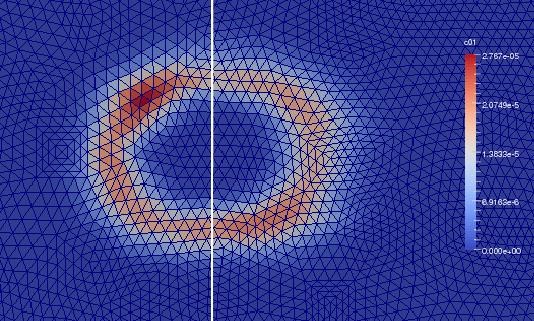The Institute had an important Cooperation Agreement (TTB/Z1015.05.04) with Forschungszentrum Jülich (2004-2012, 2012-2017), which allowed ICTP members to access the supercomputers of Forschungszentrum Jülich, and to realize important numerical applications.
Călin Vamoş and Nicolae Suciu used the computing facilities of supercomputer JURECA and its precursor clusters JUROPA and JUMP at Jülich Supercomputing Centre in numerical investigations on solute transport in groundwater. The computing projects were developed in cooperation with Prof. Harry Vereecken, from Institute of Agrosphere, at research center Jülich, Germany.
The numerical setup of the simulations was consistent with experimental data on hydraulic properties of the Krauthausen field. The physical aquifer sub-system, at scales of hundreds of meters, has been modeled as a two-dimensional regular grid with dimensions of the order of 107 nodes. The simulations were constructed with the Global Random Walk (GRW) algorithm, an efficient particle method for diffusion processes, highly accurate and free of numerical diffusion. Hundreds to thousands of processors per run on supercomputers were used in Monte Carlo simulations, further processed to assess various statistical parameters.
The ergodicity issue, concerning the relevance of stochastic models for actual realizations of the aquifer system, has been investigated through massive Monte Carlo simulations of passive transport in groundwater carried out with the GRW algorithm:
- N. Suciu C. Vamoş, J. Vanderborght, H. Hardelauf, H. Vereecken (2006), Numerical investigations on ergodicity of solute transport in heterogeneous aquifers, Water Resour. Res., 42, W04409, doi: 10.1029/2005WRR004546
- N. Suciu C. Vamoş, J. Eberhard (2006), Evaluation of the first-order approximations for transport in heterogeneous media, Water Resour. Res., W11504, doi: 10.1029/ 2005WR004714
- J. Eberhard, N. Suciu, C. Vamoş, On the self-averaging of dispersion for transport in quasi-periodic random media, J. Phys. A: Math. Theor., 40 (2007), 597-610, doi: 10.1088/1751-8113/40/4/002
Ensembles of similar GRW simulations were used to investigate memory effects and the asymptotic behavior of the transport process:
- N. Suciu, C. Vamoş, H. Vereecken, K. Sabelfeld, P. Knabner, Memory effects induced by dependence on initial conditions and ergodicity of transport in heterogeneous media, Water Resour. Res., 44 (2008), W08501, doi: 10.1029/2007WR006740
- N. Suciu, C. Vamoş, F.A. Radu, H. Vereecken, P. Knabner, Persistent memory of diffusing particles, Phys. Rev. E, 80 (2009), 061134, doi: 10.1103/PhysRevE.80.061134
- N. Suciu, Spatially inhomogeneous transition probabilities as memory effects for diffusion in statistically homogeneous random velocity fields, Phys. Rev. E, 81 (2010), 056301, doi: 10.1103/PhysRevE.81.056301
Most important results have been synthetically presented in a review paper:
Probability density approaches for groundwater systems are currently developed:
- N. Suciu, F.A. Radu, S. Attinger, L. Schüler, P. Knabner, A Fokker-Planck approach for probability distributions of species concentrations transported in heterogeneous media, J. Comput. Appl. Math., 289 (2015), 241-252, doi: 10.1016/j.cam.2015.01.030
- N. Suciu, L. Schüler, S. Attinger, C. Vamoş, P. Knabner, Consistency issues in PDF methods, Analele Stiint. Univ. Ovidius C.- Mat., 23 (2015) 3, 187-208, doi: 10.1515/auom-2015-0055
- N. Suciu, L. Schüler, S. Attinger, P. Knabner, Towards a filtered density function approach for reactive transport in groundwater, Adv. Water Resour., 90 (2016), 83–98, doi: 10.1016/j.advwatres.2016.02.016

